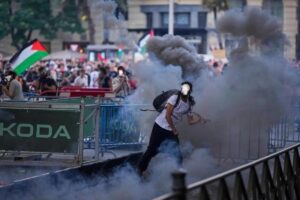
Thanks to our friends – they translated the article “Solidarity with the Peoples of Ukraine and Palestine in Western Countries: Questions of Combat Tactics”. The article was previously published in Russian (Website and Telegraph).
The full-scale Russian invasion of Ukraine, which began on February 24, 2022, is a central event for the entire political life of the post-Soviet region, including for the anarchist movement. On October 7, 2023, a new round of confrontation between the colonial state of Israel and the groups operating in colonized Palestine, primarily the authoritarian religious-nationalist movement HAMAS, began. On that day, HAMAS militants and fighters from other Palestinian organizations attacked Israel. Seizing the moment, Salafi jihadists, small and marginal in the Palestinian context, also possibly joined the attack.
During this large-scale attack, many Israeli military personnel, security forces, and armed settlers were killed, but there were also mass killings of civilians. The war quickly escalated into a genocide of the Palestinian population of the Gaza Strip, which the state of Israel is carrying out through total and indiscriminate bombings, artificially created famine, and other forms of mass extermination of the civilian population. Israel is closely linked with the countries of the so-called “West” by political, economic, military, and other ties, and is particularly dependent on the support of the world’s strongest empire, the USA. Just like the war in Ukraine for post-Soviet anarchists and leftists, confronting the genocide in Palestine has in recent years become a central point of mobilization for anarchist and revolutionary left movements in the West.
Anarchist struggle is internationalist; it is waged on different sides of state borders. In this article, we will talk about the methods of doing solidarity with the peoples of Ukraine and Palestine in Western countries and will focus primarily on combat tactics. Addressing the issue from this side seems appropriate, as a significant part of the post-Soviet anarchist and left movement has ended up in emigration, including in Western countries. In the case of Palestine, internationalism and solidarity with the struggle in this region have a long and heroic history, and the Palestinian movement itself views the Western world as an important front of resistance. We will discuss this in more detail below.
A Little Background
This article does not aim to tell the history of colonialism and occupation in Ukraine and Palestine. In the case of Ukraine, the Russian-speaking reader is familiar, at least in general terms, with both the events of recent years and the earlier imperialist colonial policy of the Russian Empire, the Soviet Union, and Yeltsin’s and Putin’s Russia. It is more difficult with Palestine – there is simply a critical lack of anarchist and revolutionary materials in Russian language that provide a comprehensive insight into the origins and history of colonization and occupation. Therefore, I will limit myself to recommending English-language materials. To understand the origins of the current genocide, I recommend reading the brochure published in June 2024 by the Kurdish Revolutionary Movement, “Reflections on Palestinian and Kurdish Resistance”. Also, the history of Palestinian resistance in recent decades is wonderfully presented in the article by the anarchist collective CrimethInc., “Ya Ghazze Habibti — Gaza, My Love: Understanding the Genocide in Palestine”. Furthermore, the anarchist organization “Compass” operates in Palestine, which includes Russian-speaking comrades. You can probably contact them directly with your questions.
Solidarity with the Peoples of Ukraine
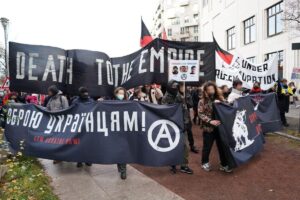 In the West, from the first day of the full-scale war, a fairly massive solidarity movement with the peoples of Ukraine emerged, joined by a significant portion of anarchists and leftists. Many immediately made contact with the “Operation Solidarity” initiative, which later reformed into “Solidarity Collectives”. Some comrades, including those with experience in armed struggle in Kurdistan, went to Ukraine themselves and joined the Anti-Authoritarian Platoon. Their experience proved very valuable for forming military organizational structures – our fallen comrade, one of the founders of the Combat Organization of Anarcho-Communists (BOAK), martyr Dmitry Petrov, wrote about this in the article “Four Months in the Anti-Authoritarian Platoon in Ukraine”.
In the West, from the first day of the full-scale war, a fairly massive solidarity movement with the peoples of Ukraine emerged, joined by a significant portion of anarchists and leftists. Many immediately made contact with the “Operation Solidarity” initiative, which later reformed into “Solidarity Collectives”. Some comrades, including those with experience in armed struggle in Kurdistan, went to Ukraine themselves and joined the Anti-Authoritarian Platoon. Their experience proved very valuable for forming military organizational structures – our fallen comrade, one of the founders of the Combat Organization of Anarcho-Communists (BOAK), martyr Dmitry Petrov, wrote about this in the article “Four Months in the Anti-Authoritarian Platoon in Ukraine”.
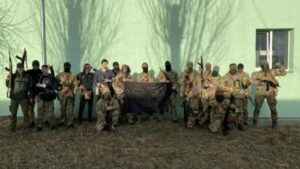
Anti-Authoritarian Platoon in its early days
In the West, after the start of the full-scale war, mass solidarity actions with the peoples of Ukraine took place. Anarchists and leftists participated in them, simultaneously giving the pro-Ukrainian campaign a more radical character, involving anti-capitalist, anti-statist, and environmental agendas. For example, in March 2022, anarchists seized the London mansion of Russian oligarch Deripaska. This was an action directed against Russian aggression, but at the same time, it highlighted the problems of unfair distribution of resources in modern society, homelessness, police repression against refugees and migrants, racism, and colonialism. Also in March 2022, in Glasgow, participants of a leftist climate initiative blocked the office of the ship company “Seapeak,” linked to the Russian state. The goal of the blockade was to hinder the trade of Russian oil. But simultaneously, the action was directed against all energy corporations whose activities have a destructive impact on nature, against the entire capitalist system that is destroying the planet for the sake of power and profit.
Symbolic acts of sabotage against Russian embassies, consulates, and trade missions, such as the repeated drone-painting of the Russian embassy in Stockholm, continued throughout the full-scale war. The role of anarchists in these events is currently unclear. Anarchists also participated in demonstrations organized by the Russian opposition in Berlin and other cities. Anarchist columns joined them with slogans calling for increased support for Ukrainian resistance, including by transferring more weapons to Ukraine.

And yet, the most serious anti-Russian actions were not carried out by anarchists. The loudest pro-Ukrainian action in the West so far should be considered the sabotage of the Nord Stream and Nord Stream 2 gas pipelines in the Baltic Sea on September 26, 2022. The German authorities investigating the sabotage have brought charges against Ukrainian citizens, including those linked to the SBU (Security Service of Ukraine). The investigative bodies suggest that the attack was coordinated with or even directly organized by the Ukrainian military-political leadership.
When considering practical solidarity with the peoples of Ukraine in the West, including combat tactics, one must realize that its possibilities are very limited. Firstly, Western countries have introduced quite painful sanctions against Russia and are supplying, albeit in insufficient quantities, weapons to Ukraine. Even the Russian “shadow fleet” for oil trade – a potential target for advanced anarchist sabotage – faces opposition from European authorities. For instance, on October 2 of this year, the Boracay tanker from the “shadow fleet”, heading from the Leningrad region to India, was captured by French special forces in the English Channel. The cautious, pragmatic, but still confrontational stance of many European states towards Russia narrows the scope for anarchist combat activity. Naturally, if for one reason or another normalization of cooperation with the Russian state occurs, this situation will also change. One of the tasks of the current pro-Ukrainian actions is to prevent such normalization.
Secondly, attacks against the Russian state in the West worry Putin little. The Russian regime has maintained relative stability even under the pressure of sanctions by Western countries. An embassy pelted with paint or a burned-down trade mission in some European capital does not trouble Putin at all. This does not mean that such actions are wrong; from an ethical and practical point of view, they are completely correct. One just needs to understand the horizon of achievable results.
Under these conditions, a combat action that could truly have a serious effect, inspiring for us and frightening for our enemies, would be, for example, the liquidation of a Russian state official of the first or second tier, say, Slutsky (Russian politician), who was recently in Switzerland. Naturally, such an action is extremely difficult from a technical point of view, especially considering that the anarchist movement is under surveillance by intelligence services not only in Russia and Belarus but also in the West.
Simultaneously, almost all military analysts note that the main problem of the Ukrainian Defense Forces, which makes the daily advance of Russian troops possible, is an elementary shortage of infantry, especially motivated infantry. Throwing paint at Russian embassies is certainly a good thing, but if you are primarily driven by a pro-Ukrainian position and have no other critical commitments in the collective struggle, perhaps you should take your place in a trench with an assault rifle or a machine gun. Today, getting to the front in Ukraine is not so difficult, even if you have a Russian or Belarusian passport. When implementing these plans, we recommend contacting the anti-authoritarian recruitment platform launched by the “Solidarity Collectives”.
Let us also not forget that a simply pro-Ukrainian position has many points of intersection with an anarchist revolutionary position but is not completely identical to it. Our martyr Dmitry Petrov wrote about this in the article “To Be an Independent Force” in November 2022. Dima noted:
“The second, seemingly opposite, approach is proactive, but similar to the first in terms of its outcomes. Its supporters argue that anarchism and revolutionary struggle are not on the agenda right now, “first we will defend Ukraine from invasion,” “first we will overthrow Putin/Lukashenko (underline as appropriate),” we will throw ourselves headlong into this work, and then… No, my friends, if at the point of bifurcation you decide to postpone your ideas until better times, you can safely assume that you are shelving them forever.
Fortunately, there are many worthy people among us who devote a great deal of energy and effort to serious tasks. It is vitally important that these tasks and efforts serve the goals of revolutionaries — the restructuring of society on libertarian principles. For such a restructuring, a powerful, organized movement with great ideological and practical influence is necessary.”
Despite the importance of participating in the armed defense of the peoples of Ukraine, one should remember that there is currently no separate anti-authoritarian unit. Nonetheless, extremely important organizational work is being carried out by comrades, and they need support. At the same time, activity in emigration can also be useful. Take the opposition demonstrations in Berlin for example. Participation in them in the format of a separate column increases the level of organization of the movement and also hones a number of useful skills that may be needed in the future – how to gather comrades from different cities and regions in one place at one time, how to form up, how to prepare for possible clashes with the police and right-wingers. Furthermore, these actions preserve the memory of fallen heroes and contribute to the formation of a culture of struggle and martyrdom in the anarchist community.
In general, there is work to be done everywhere, but the main front is unequivocally in Ukraine.
Solidarity with the Peoples of Palestine
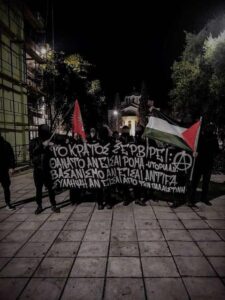 As already noted, Palestinian internationalist struggle has a long and heroic tradition. The RAF (Red Army Faction), “Revolutionary Cells,” “2 June Movement,” and other urban guerrilla groups organized their actions worldwide together with the Palestinian Revolutionary Movement. Revolutionaries from Europe underwent ideological and combat training in the military camps of Palestinian organizations. In 1982, internationalists fought together with Palestinians against the state of Israel, which had invaded Lebanon. For example, the German revolutionary, participant of the “2 June Movement,” Ingrid Siepmann, fought against the occupiers as part of a Palestinian women’s brigade and died in battle. Footage of the Kurdistan Workers’ Party (PKK) during the Lebanese War, together with Palestinian fighters, defended the strategically important village of Arnoun – this was discussed in a separate article. Ten Kurdish revolutionaries became martyrs in that cruel battle.
As already noted, Palestinian internationalist struggle has a long and heroic tradition. The RAF (Red Army Faction), “Revolutionary Cells,” “2 June Movement,” and other urban guerrilla groups organized their actions worldwide together with the Palestinian Revolutionary Movement. Revolutionaries from Europe underwent ideological and combat training in the military camps of Palestinian organizations. In 1982, internationalists fought together with Palestinians against the state of Israel, which had invaded Lebanon. For example, the German revolutionary, participant of the “2 June Movement,” Ingrid Siepmann, fought against the occupiers as part of a Palestinian women’s brigade and died in battle. Footage of the Kurdistan Workers’ Party (PKK) during the Lebanese War, together with Palestinian fighters, defended the strategically important village of Arnoun – this was discussed in a separate article. Ten Kurdish revolutionaries became martyrs in that cruel battle.
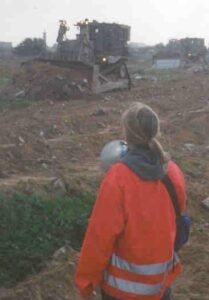
Martyr Rachel Corrie
in the day of her death
During the First Intifada (1987 – 1993) and after it, the center of gravity of resistance to the colonial state of Israel moved to Palestine, and this influenced the nature of internationalism. A prominent chapter in internationalist struggle was the activity of the International Solidarity Movement (ISM), created in 2001. One of ISM’s main methods was the physical protection, as a “human shield,” of Palestinian homes from demolition and the expulsion of their residents. Often, settlers and the military assisting them hesitated to act against internationalists from Western countries and Israeli citizens as harshly as they would against disenfranchised Palestinians, and therefore this non-violent tactic yielded results. Despite ISM’s non-violent methods, several participants of this initiative were killed or maimed by the military and settlers. The murder of the internationalist from the USA, martyr Rachel Corrie, on March 16, 2003, found the most resonance. She was working in the Gaza Strip and was crushed to death by an Israeli military bulldozer while protecting a Palestinian home from demolition. In the West Bank, ISM continues its activities to this day.
Another example of internationalist struggle in Palestine should be considered the activity of the anarchist initiative “Anarchists Against the Wall”, formed in 2003 and now defunct. Its participants, mainly Israeli citizens, participated in blockades and sabotage together with Palestinians. By joining the joint struggle, the participants of the initiative saw their goal as the abolition of Israeli colonial society, the deconstruction of colonial identity and colonial, racist mentality, which is a prerequisite for equal and friendly coexistence among all ethnic and religious groups inhabiting Palestine.
After the start of the new war and genocide, Western countries once again became an extremely important front of struggle for the Palestinian movement, including for the anarchists and leftists participating in it. Why? Getting into Gaza to participate in the armed struggle is extremely difficult; the Gaza Strip is an open-air prison, blocked from all sides, from the air and the sea. The area itself is poorly suited for guerrilla resistance, and therefore HAMAS and other armed organizations have built a network of tunnels, using which small groups of fighters can carry out successful attacks. Under these conditions, physically getting into the Gaza Strip and joining a guerrilla structure whose participation is ideologically compatible with a libertarian position seems an almost impossible task.
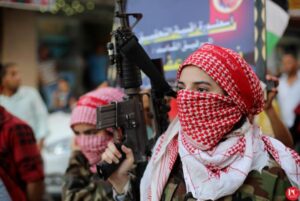
Demonstration of the leftist Popular Front for the Liberation of Palestine in Gaza
But, as noted in the CrimethInc. article “Ya Ghazze Habibti — Gaza, My Love: Understanding the Genocide in Palestine“, this is not necessary. Unlike Russia, the state of Israel is critically dependent on the help of Western states, primarily the USA. The Trump administration and other Western governments continue to support the Israeli regime and the genocide, although in Europe the situation, under pressure from mass popular resistance, is beginning to change. Furthermore, there is also a feedback loop in the relations between Israel and the West: the state of Israel, a militaristic colonial island of “civilization” in a colonized “barbaric” environment, is an exporter of fascist concepts and military-police technologies for suppressing social movements and controlling wage workers, poor ghettos, and “undesirable” marginalized groups in the Western metropolis itself. This makes Western countries a vitally important front in the struggle against the genocide in Palestine and the global oppression, inequality, and exploitation intertwined with it.
On this front, the international anarchist movement has applied a rich arsenal of combat tactics over the past two years. It has included demonstrations and clashes with the police, blockades of Israeli companies and Western corporations aiding the state of Israel, blockades of ports through which weapons are shipped to Israel, occupations of university campuses, and, of course, acts of sabotage, numbering in the hundreds. The participation of anarchists in the Palestinian movement has once again shattered the liberal myth that radical actions scare away “ordinary people.” For instance, on the 2nd and 3rd of October this year, after the Israeli authorities seized part of the international flotilla “Sumud” heading to Gaza, between one and three million people took to the streets of Italian cities, demanding an end to the genocide. Large-scale solidarity actions with hundreds of thousands of participants also took place in other European countries. This is one of the largest social mobilizations in Europe since 1968. Demonstrations, strikes, clashes with the police, sabotage – participants of the Palestinian movement often manage to combine all these methods into a single struggle without the liberal, destructive division into “good,” “peaceful” demonstrators and “bad extremists,” which is advantageous to the authorities. This lesson will be useful in new revolutionary battles, both in the West and in other regions, including the post-Soviet space.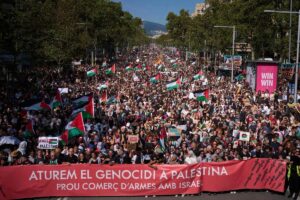
This unity was also manifested during the repressive steps of the authorities. Thus, in July 2025, the English state declared the leftist initiative “Palestine Action,” which carried out acts of civil disobedience and sabotage, a terrorist organization. Within a few months, over a thousand people were arrested for allegedly participating in its activities. But now, mass solidarity demonstrations with “Palestine Action” are taking place across the country, joined by people previously far from illegal forms of resistance.
The solidarity movement with the peoples of Palestine has not yet managed to stop the genocide. And yet, in recent months, under pressure from mass street actions in European capitals, there is increasingly talk of the isolation of the Israeli regime. For now, the state of Israel can count on the unconditional support of the American Trump administration, but the emerging trends towards isolation may in the future threaten this colonial project. The combat tactics of anarchists have served to mobilize and radicalize the Palestinian movement. The front of the Palestinian struggle in the West remains open, making a significant contribution to the confrontation with the genocidal state of Israel and all global oppression.
Conclusion
The solidarity movements with the peoples of Ukraine and Palestine in the West, for the reasons described in the article, are of a different nature. For the Palestinian movement, Western countries are an extremely important front, while for Western and post-Soviet anarchists in solidarity with Ukrainian resistance, the struggle in the West is of an auxiliary nature – the main events are unfolding in Ukraine and the post-Soviet space. And yet, these two directions of global resistance are closely interconnected. This is very well written in the CrimethInc. article “Ya Ghazze Habibti — Gaza, My Love: Understanding the Genocide in Palestine“:
“Palestine is deeply connected to the Syrian revolution, the tragedy of Sudan, the revolutionary feminists of Iran, the Rojava revolution, the uprising in Lebanon, the many movements in the Middle East since the Arab Spring, and—more globally—the Stop Cop City and Black Lives Matter movements in the US, the anti-colonial struggles of Indigenous peoples everywhere, the anti-junta resistance in Myanmar, Ukrainian resistance to Russian imperialism, and all struggles for freedom and liberation. We draw inspiration, strength, and lessons from each other. A Palestinian victory in Gaza would send waves of freedom to the farthest corners of the earth, while an Israeli victory will embolden those pursuing violent and genocidal strategies everywhere, strengthen the grip of reactionary and authoritarian alliances over entire populations, and enable them to further crush movements of liberation, whether in the name of “stability” or of “resistance.” If we depend on each other, we had better start acting accordingly. Who knows how much time we have left.”
A victory of Ukrainian resistance over the aggressive empire will open up opportunities for the development of revolutionary prospects in the post-Soviet space. A military failure for Israel will be a step towards the abolition of the colonial, racist project in Palestine and will bring closer the peaceful coexistence of all ethnic and religious groups in that region – together and as equals. The struggle on these fronts of the global revolutionary struggle continues, and it is never too late to become a part of it!
Fedai
“Anarchist Militant,” read us on Telegram
